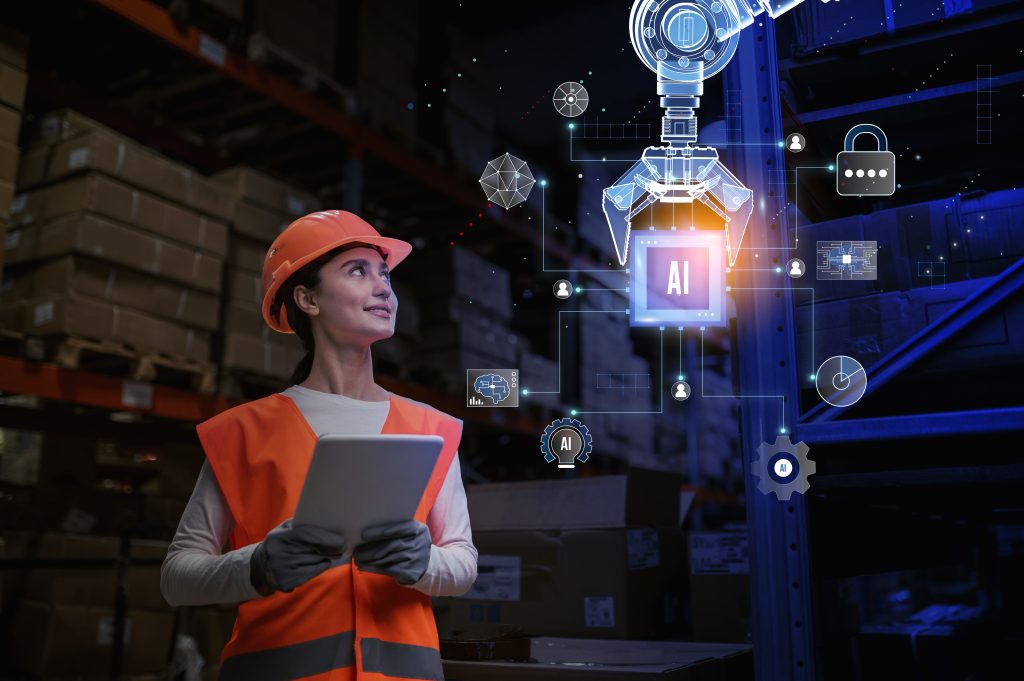Have you ever wondered how AI could play a pivotal role in transforming supply chains and making them more sustainable? Imagine a world where businesses can achieve their economic goals while also prioritizing environmental responsibility. In this discussion, we will explore the powerful potential of AI in revolutionizing supply chain sustainability. By harnessing the capabilities of AI, organizations can make data-driven decisions, optimize inventory levels, and minimize waste, all while reducing their environmental footprint. But that’s not all – there are also important considerations and potential risks associated with integrating AI into supply chains. So, join us as we unravel the fascinating ways in which AI is reshaping supply chains and paving the way for a more sustainable future.
Benefits of AI in Supply Chain Sustainability
By incorporating AI into supply chain sustainability, you can unlock a multitude of benefits that will contribute to a more equitable and environmentally conscious global economy. AI enables data-driven decision making, allowing businesses to implement effective sustainability initiatives. With AI, you can develop tech-smart approaches to corporate sustainability, reducing the environmental impact of supply chains.
One of the key advantages of AI in supply chain sustainability is its ability to collect and synthesize sustainability data. Modern supply chains are complex, making it difficult to track and measure environmental data. AI can manage this by examining large volumes of data from various sources, identifying patterns and trends to improve predictability. It provides insights and suggestions for improvement, working quickly and producing insights and visualizations with fewer errors than humans.
Furthermore, AI helps track data and decrease environmental harm through advanced technologies. It can monitor a business’s sustainability performance by providing continuous feedback. AI can track carbon emissions, waste generation, water consumption, and energy usage, enabling real-time data sharing among supply chain networks to address errors and implement improvements. Additionally, AI assesses risks and opportunities for improving sustainability performance, predicting future risks and suggesting ways to mitigate or eliminate sustainability endangerments.
AI’s Role in Collecting and Synthesizing Sustainability Data
In order to effectively collect and synthesize sustainability data, AI plays a crucial role in managing the complexities of modern supply chains and providing actionable insights for improvement. AI driven data management allows for the examination of large volumes of data from various sources, enabling the tracking and measurement of environmental data. With the help of predictive analytics, AI can identify patterns and trends, improving predictability and enhancing sustainability tracking. By analyzing current progress and conducting environmental impact analysis, AI can provide data-driven insights and suggestions for improvement. Moreover, AI works quickly and produces insights and visualizations with fewer errors than humans, ensuring the accuracy and reliability of the data. Through its capabilities in collecting and synthesizing sustainability data, AI empowers businesses to make informed decisions and implement effective sustainability initiatives. By leveraging AI’s data-driven insights, organizations can drive positive change, reduce environmental impact, and create a more sustainable future for supply chains.
Tracking Data and Decreasing Environmental Harm Through Advanced Technologies
Advanced technologies enable the tracking of data and the reduction of environmental harm in supply chains. By incorporating real-time monitoring, predictive analysis, and data-driven decision making, businesses can continuously improve their sustainability efforts and assess potential risks. Here’s how advanced technologies can help track data and decrease environmental harm:
- Real-time monitoring: Advanced technologies allow for the real-time tracking of carbon emissions, waste generation, water consumption, and energy usage. This enables businesses to identify areas of improvement and take immediate action to reduce their environmental footprint.
- Predictive analysis: Through predictive analysis, AI can anticipate future risks and suggest ways to mitigate or eliminate sustainability endangerments. By analyzing current progress and trends, businesses can proactively implement measures to minimize environmental harm.
- Continuous improvement: Advanced technologies provide insights and suggestions for improvement based on data analysis. With AI’s ability to quickly examine large volumes of data from various sources, businesses can make data-driven decisions to optimize their supply chain sustainability.
Maximizing Profit While Reducing Environmental Footprint Through AI
To maximize profits while reducing your environmental footprint, AI technologies can provide valuable insights and strategies for optimizing supply chain sustainability. AI can play a crucial role in waste reduction, inventory management, and eco-friendly product delivery, leading to sustainable profit optimization.
AI-driven inventory management can help businesses accurately forecast demand, analyze sale patterns, and identify supply chain trends. By optimizing inventory levels, companies can reduce waste and avoid overproduction, minimizing losses and improving environmental sustainability.
Furthermore, AI can enable eco-friendly product delivery by optimizing routes, considering factors such as traffic, weather, and customer preferences. This not only reduces delivery time and cost but also minimizes the carbon footprint associated with transportation.
In addition to waste reduction and eco-friendly delivery, AI can also enhance customer satisfaction. By analyzing customer data and preferences, AI can personalize recommendations, improve order accuracy, and enhance the overall shopping experience.
Risks and Mitigation Strategies for AI Integration
Implementing AI technology in supply chains comes with potential risks and challenges that need to be carefully considered and mitigated. To ensure the successful integration of AI in supply chains and minimize any negative impacts, it is important to address the following:
- Ethical implications: AI systems must be designed and programmed to adhere to ethical guidelines. It is crucial to consider the potential biases and discrimination that can arise from AI algorithms. Bias detection and mitigation strategies should be implemented to ensure fairness and equality in decision-making processes.
- Privacy concerns: As AI relies on large amounts of data, privacy concerns must be taken into account. Companies should adopt robust privacy measures to protect sensitive information and ensure compliance with relevant regulations. Transparency in data collection and usage should also be prioritized to build trust with stakeholders.
- Algorithm transparency and accountability measures: It is important to have clear visibility into how AI algorithms make decisions. Ensuring algorithm transparency allows for better understanding and identification of potential errors or biases. Accountability measures should be in place to address any negative consequences that may arise from AI integration.
Sustainability Assessment and Circular Economy Design
Sustainability assessment and circular economy design play a crucial role in optimizing supply chains for environmental and economic sustainability. AI-powered ESG ratings are instrumental in evaluating and improving the sustainability performance of supply chains. By analyzing data from various sources, AI can provide reliable scorecards with actionable ratings, enabling businesses to make informed decisions and implement effective sustainability initiatives. Circular economy optimization is another key aspect where AI can contribute. By suggesting reuse, refurbishment, and recycling opportunities, AI helps businesses design products with circularity in mind. AI also optimizes route planning for last-mile deliveries and return-management processes, reducing delivery carbon footprint. Furthermore, AI analyzes energy usage data and identifies opportunities for energy efficiency improvements, minimizing electricity consumption in offices and facilities. Collaborative shipping opportunities are enhanced through AI algorithms, which identify potential partnerships and optimize routes, leading to cost savings and reduced pollution. In conclusion, AI plays a significant role in sustainability assessment and circular economy design, enabling supply chains to reduce their environmental impact and improve economic efficiency.
Read next:



